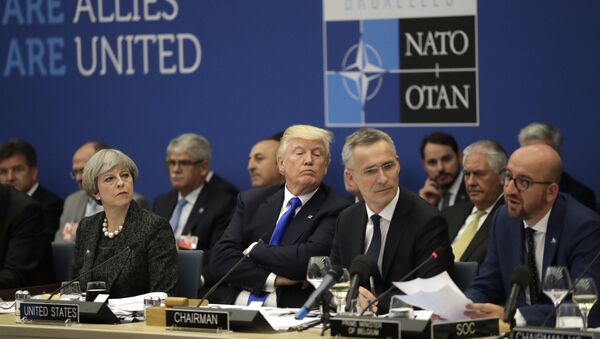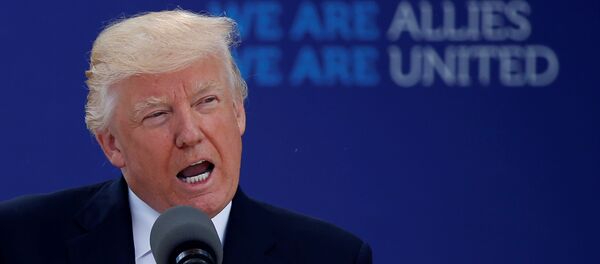Donald Trump sent NATO members' leaders letters urging them to pay up and commit to the NATO pledge to spend 2% of GDP on defense.
"[It's] increasingly difficult to justify to American citizens why some countries do not share NATO's collective security," the letters said, according to Foreign Policy. "I, therefore, expect to see a strong recommitment by [country name] to meet the goals to which we all agreed," the messages added.
The sharply worded messages, coming just two weeks ahead of the NATO summit in Brussels on July 12, have prompted another round of panic among proponents of the Western alliance. Political observer and The Guardian contributor Martin Kettle suggested that Trump was "hellbent on destroying the NATO alliance," adding that the US leader's "increasing hostility shows he has little interest in the Transatlantic partnership."
The letters come amid reports that the Pentagon is conducting a cost assessment study on the 35,000 active-duty troops it has stationed in Germany, with Trump reportedly concerned about the hefty cost of keeping them in the country. Commissioned earlier this year, the study too has caused alarm among allies.
New Attacks on the EU
The NATO-related news was complimented by a report this week in the Washington Post that during his meeting with French President Emmanuel Macron in April, President Trump bluntly asked him "Why don't you leave the EU?" Two unnamed European officials told the paper that Trump told Macron that Washington would offer France better trade deals if Paris left the EU bloc. The White House declined to comment on the report, but did not refute it.
Details on the Macron heart-to-heart follows a Trump rally in North Dakota this week, where the president told supporters that while Americans "love the countries of the European Union," the bloc "was set up to take advantage of the United States. And you know what, we can't let that happen."
Trade Troubles
The trade schism prompted European Council President Donald Tusk to warn this week that Transatlantic relations were under "immense pressure," and that Brussels "must be ready to prepare our union for worst-case scenarios" with Trump on trade.
Rupture or Reset?
The question undoubtedly worrying foreign policy observers and pundits on both sides of the Atlantic is what Trump is trying to accomplish with his harsh rhetoric and tough policy. Amid concerns by proponents of the US-led world order that the president's move may be the end of US hegemony, Secretary of State Mike Pompeo sought to allay fears by telling The Wall Street Journal that that what Trump really wants is a "reset."
"When I watch President Trump give guidance to our team, his question is always 'How does that structure impact America'?" the secretary explained, adding that in the post-Cold War period, "President Trump has properly identified a need for a reset."
According to Pompeo, many of the economic and diplomatic structures Trump has been accused of undermining were created at the end of WWII, at a time during which they "made sense" for America.
Trump, according to the secretary of state, "recognizes the importance of American leadership," but is also "prepared to be disruptive" to repair "arrangements that put America, and American workers, at a disadvantage." Washington's goal, Pompeo said, was to reform rules "that no longer are fair and equitable."
"Strengthening the West means making hard decisions today when we initially disagree, rather than continuing to accept the appearance of transatlantic unity for the sake of avoiding disagreement," Mitchell said, speaking at a conference in Brussels.
Perestroika (Restructuring) of the US-EU Relationship?
Speaking to Sputnik, Dr. Timofei Bordachev, Valdai Discussion Club program director and Higher School of Economics lecturer, said that Trump's goal was not to destroy the European Union or NATO; it's just that he doesn't pay them as much regard as his predecessors had.
"Trump has set before him the task of restructuring the entire system of relations inside the Western world that was created during the Cold War. Today, this system is clearly at an impasse. The Western world has ceased to meet American interests, and Trump is now doing everything possible to ensure that the EU, NATO, and all other European institutions comply with them," Bordachev explained.









